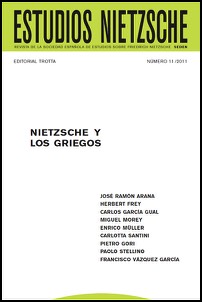Nietzsche and Epicurus
DOI:
https://doi.org/10.24310/EstudiosNIETen.vi11.10505Keywords:
Nietzsche, Epicurus, epicureism, ancient philosophyAbstract
The frequent quotations from Epicurus found in many works by Nietzsche give evidence of his sympathy for the person and doctrine of the ancient philosopher of the Garden. In Epicurus’ philosophy Nietzsche finds a clear opposition to the Christian faith and moral, and a serene message of an earthly and easy happiness.
Downloads
Metrics
References
Nietzsche, F., Obras Completas, I-IV (OC ). Director ed. Diego Sánchez Meca. Madrid: Tecnos, 2011-2016
Nietzsche, F., Correspondencia I-VI. (CO). Director ed. Luis E. de Santiago Guervós. Madrid : Trotta, 2005- 2012.
Nietzsche, F., Fragmentos Póstumos I-IV (FP). Director ed. Diego Sánchez Meca. Madrid: Tecnos, 2006-2010.
Kofman, Sarah, Nietzsche et la scène philosophique, París, 1979.
Fink, E. La filosofía de Nietzsche, Madrid: Alianza, 1966.
García Gual, C., Epicuro, Madrid: Alianza, 1981.
Usener, Hermann, Epicurea, Leipzig, 1887.
Müller, R., Die epikureische Gesellschaft, Berlin: Akademie Verlag, 1974.
Markovits, F., Marx dans le jardin d´Épicure, París, 1974.
Downloads
Published
How to Cite
Issue
Section
License
As of issue 21 (2021) this journal is published only in open access (diamond route).
From that number 21, like the previous numbers published in NIETZSCHE STUDIES, they are subject to the Creative Commons Acknowledgment-NoComercia-ShareIgual 4.0 license, the full text of which can be consulted at <http://creativecommons.org/licenses/by-nc-sa/4.0 >
It is the responsibility of the authors to obtain the necessary permissions of the images that are subject to copyright.
This work is licensed under a Creative Commons Attribution-NonCommercial-ShareAlike 4.0 International License.
Copyright generates two different rights: moral rights and patrimonial rights that EJFB recognizes and respects. Moral rights are those relating to the recognition of the authorship. They are rights of a personal nature that are perpetual, inalienable, unseizable and imprescriptible as consequence of the indivisible union of the author and his/her work.
Patrimonial rights are those that can be derived from the reproduction, distribution, adaptation or communication of the work, among others.







11.png)
